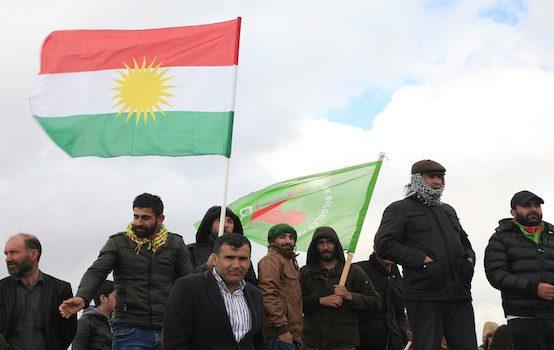No Time for Kurdish Independence in Iraq

In September, the people of Iraqi Kurdistan will embark on a critical path: They are expected to vote overwhelmingly in favor of statehood. Misery, hardship, and a possible war with their neighbors may result.
The Kurds, with a population just short of 30 million, are spread over an area of four countries with nearly 15 million in Turkey, six million in Iran, six million in Iraq, and two million in Syria. Their suffering—through deportations, oppression, discrimination, and genocidal acts—has shaped their ongoing desire for autonomy.
The six million Kurds in Iraqi Kurdistan are governed by a federated system of government that has allowed Kurds greater freedom and opportunity than in any other country in which their ethnic group resides in the region. In Iraqi Kurdistan, a peaceful, and sometimes prosperous existence has given the Kurds all of the trappings of a state. Cultural, educational, and political institutions are controlled autonomously. Many Kurds feel that the formation of a fully autonomous state is the logical next step.
In the past five years, however, Kurdistan has declined. External factors have been significant: the war on ISIS (Islamic State); a global drop in oil prices; economic woes in the region. As a result, salaries for government employees have gone unpaid and the flight of foreign investment has been significant. In addition, neighboring Iran and Turkey, with their large Kurdish populations, are vehemently opposed to a free Kurdistan on their borders for fear of sparking a similar movement in their country. (Both Iran and Turkey, with their powerful militaries, would not hesitate to use their might to stop such movements in their countries. Kurdistan could not win a fight against the military superiority of these nations. Moreover, at present, even though the United States is an ally of the Kurds, current policy does not support statehood for Kurdistan.)
Kurdistan’s internal decline would be destructive to any efforts for statehood. Democratic institutions have faltered. Corruption is rampant. President Masoud Barzani has continued in office for four years beyond his term so far without any elections. Parliament has not met in two years. The Kurdistan Regional Government (KRG) and its military force—the Peshmerga—are nearly broke. Income has declined because the central government of Iraq is not paying Kurdistan their share of oil revenue due to the many moves Kurdistan has made that work against the federal government in Baghdad. (For example, Kurdistan built its oil pipeline through Turkey. They negotiated oil contracts directly with the oil companies without the approval of the central government in Iraq).
Barzani’s move to remain as president mirrors those of corrupt leaders throughout the developing world, using the statehood referendum in September 2017 to deflect attention away from his power grab. In a recent Washington Post oped, Barzani advocated strongly for statehood, emphasizing the atrocities Saddam Hussein committed on the Kurdish people in the 1980s and the many agreements broken by the Iraqi government.
Barzani did not address the 2008 constitutional referendum, in which Iraqi citizens voted for a federalist Iraq. This allowed Kurdistan to operate as a semi-autonomous state, free from most of the central government’s intrusions. Nouri al-Maliki, the influential vice-president of Iraq and former prime minister, reminds everyone that the 2008 referendum binds the Kurds to follow the constitution within its federal system and government. He has warned that force would be used if necessary to continue that arrangement.
Yet after years of suffering and the desire for self-determination, the Kurds will overwhelmingly vote for statehood. Barzani will likely remain a president for a much longer time, which does not bode well for Kurdistan. Barzani’s party, the Kurdistan Democratic Party (KDP) vies for power against the Patriotic Union of Kurdistan (PUK), the largest party rivaling KDP and a more recently formed new party, the Gorran movement (Movement for Change) which (after KDP) became the second-largest party in parliament. Party friction has never been higher. There is much dissatisfaction with the regional government, with the three major parties at each other’s throats.
In recent history, many peoples have aspired to full autonomy, some with success. But history is littered with sad and violent failures of peoples trying to gain their own states or increased power over their homeland. These failed states suffered horrible consequences in dealing with the demands of one faction or another—or civil war. The Balkan Wars in the 1990s, Sudan, Ethiopia, Libya, and Syria are tragic examples of such endeavors.
The Kurds wish to solidify their autonomy with the formation of a state. However, at this point in history, such a move launches Kurdistan on a very uncertain and dangerous path. This is not a viable time for the birth of an independent state in northern Iraq.
Adil E. Shamoo is an associate fellow of the Institute for Policy Studies, a senior analyst for Foreign Policy in Focus, and the author of Equal Worth — When Humanity Will Have Peace.